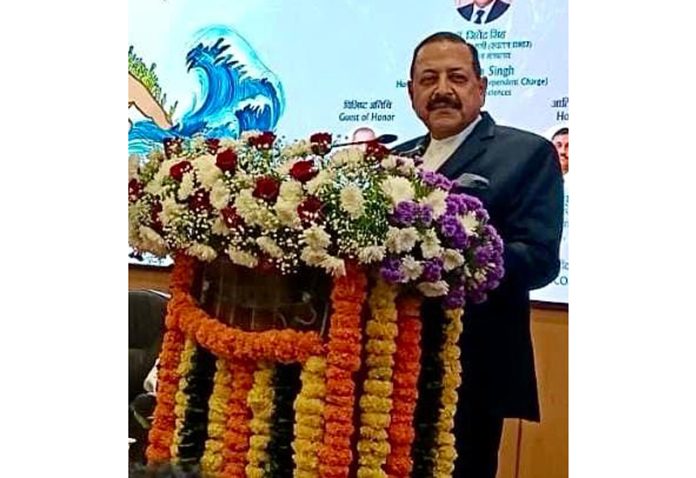
Excelsior Correspondent
HYDERABAD, Dec 26: Union Minister of State (Independent Charge) for Science and Technology; (Independent Charge) Earth Sciences and Minister of State for PMO, Department of Atomic Energy, Department of Space, Personnel, Public Grievances and Pensions, Dr. Jitendra Singh, while addressing the Hyderabad Conclave commemorating 20th anniversary of “2004 Indian Ocean Tsunami” at INCOIS (Indian National Centre for Ocean Information Services), lauded India’s global excellence in “disaster warning” and said that India today has emerged as a global leader in “disaster warning”, also catering to other nations across the world.
Dr Jitendra Singh lauded PM Modi’s pathbreaking ocean initiatives including the ‘Deep Sea Mission’ which he had announced in his Independence Day address.
He also highlighted India’s quantum progress in ocean research and disaster preparedness.
The Minister emphasized the nation’s emergence as a global leader in providing world-class disaster warning systems, underscoring the pivotal role of scientific advancements in fostering safety and sustainability.
Reflecting on the catastrophic tsunami that claimed over 230,000 lives worldwide, including 10,749 in India, Dr.Jitendra Singh remarked on the invaluable lessons learned and the transformative policies that followed. “The tragedy served as a catalyst for establishing institutions like INCOIS, which now stands as a testament to India’s commitment to safeguarding lives and livelihoods,” he said.
The Minister also noted ongoing collaborations with UNESCO and the Tsunami Ready Initiative, which aims to bolster community resilience across vulnerable regions. He cited the recognition of 24 Indian communities under this program as evidence of a community-centric approach.
Dr. Jitendra Singh underlined the growing significance of oceanic exploration in India’s journey toward becoming “Viksit Bharat”. With a 7,500-kilometer coastline and abundant marine resources, he advocated for their sustainable exploration and conservation. “Our deep-sea mission and initiatives like BioE3 [Biotechnology for Environment, Employment, and Economy] are creating an ecosystem that will not only enhance biodiversity but also contribute to national prosperity,” he said.
Looking ahead, the Minister expressed optimism about concurrent breakthroughs in space and marine missions, envisioning an India that leads globally in both realms. “We are planning to deploy an Indian in the deep sea and another in space, possibly by 2026, marking a historic milestone,” he announced.
Dr. Jitendra Singh also highlighted India’s proactive role in international collaboration through INCOIS, which hosts a UNESCO Category 2 Training Centre. This center acts as a hub for capacity building and knowledge sharing on ocean-based disaster management. He noted INCOIS’s active involvement in the Ocean Decade Tsunami Programme, which aims to achieve 100% tsunami-ready communities globally by 2030. “Through initiatives like these, we are not only strengthening global partnerships but also paving the way for resilient coastal communities worldwide,” he remarked.
Additionally, the Minister underscored the need to integrate tsunami warnings with other ocean-related hazards, such as storm surges and high waves, into a comprehensive multi-hazard early warning system. He emphasized that such advancements would sustain India’s tsunami warning capabilities while addressing the growing complexity of oceanic risks. “This forward-looking approach will ensure that we continue to safeguard lives and livelihoods against a wide spectrum of potential disasters,” he added.
The event, attended by Dr. M. Ravi Chandran, Secretary, Ministry of Earth Sciences, and eminent scientists and policymakers, served as a platform to celebrate two decades of achievements while charting a path forward for holistic and sustainable development.

